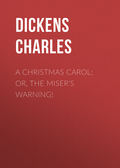
Чарльз Диккенс
The Posthumous Papers of the Pickwick Club. Volume 1 of 2
Preceding Mr. Weller, with the utmost politeness, Mr. Muzzle conducted him into the kitchen.
“Mary,” said Mr. Muzzle to the pretty servant-girl, “this is Mr. Weller: a gentleman as master has sent down, to be made as comfortable as possible.”
“And your master’s a knowin’ hand, and has just sent me to the right place,” said Mr. Weller, with a glance of admiration at Mary. “If I wos master o’ this here house, I should alvays find the materials for comfort vere Mary wos.”
“Lor, Mr. Weller!” said Mary, blushing.
“Well, I never!” ejaculated the cook.
“Bless me, cook, I forgot you,” said Mr. Muzzle. “Mr. Weller, let me introduce you.”
“How are you, ma’am?” said Mr. Weller. “Wery glad to see you, indeed, and hope our acquaintance may be a long ’un, as the gen’lm’n said to the fi’-pun’ note.”
When this ceremony of introduction had been gone through, the cook and Mary retired into the back kitchen to titter, for ten minutes; then returning, all giggles and blushes, they sat down to dinner.
Mr. Weller’s easy manners and conversational powers had such irresistible influence with his new friends, that before the dinner was half over they were on a footing of perfect intimacy and in possession of a full account of the delinquency of Job Trotter.
“I never could a-bear that Job,” said Mary.
“No more you never ought to, my dear,” replied Mr. Weller.
“Why not?” inquired Mary.
“Cos ugliness and svindlin’ never ought to be formiliar vith elegance and wirtew,” replied Mr. Weller. “Ought they, Mr. Muzzle?”
“Not by no means,” replied that gentleman.
Here Mary laughed, and said the cook had made her; and the cook laughed, and said she hadn’t.
“I han’t got a glass,” said Mary.
“Drink with me, my dear,” said Mr. Weller. “Put your lips to this here tumbler, and then I can kiss you by deputy.”
“For shame, Mr. Weller!” said Mary.
“What’s a shame, my dear?”
“Talkin’ in that way.”
“Nonsense; it ain’t no harm. It’s natur; ain’t it, cook?”
“Don’t ask me, imperence,” replied the cook, in a high state of delight: and hereupon the cook and Mary laughed again, till what between the beer, and the cold meat, and the laughter combined, the latter young lady was brought to the verge of choking – an alarming crisis from which she was only recovered by sundry pats on the back, and other necessary attentions, most delicately administered by Mr. Samuel Weller.
In the midst of all this jollity and conviviality, a loud ring was heard at the garden-gate: to which the young gentleman who took his meals in the wash-house immediately responded. Mr. Weller was in the height of his attentions to the pretty housemaid; Mr. Muzzle was busy doing the honours of the table; and the cook had just paused to laugh, in the very act of raising a huge morsel to her lips; when the kitchen-door opened, and in walked Mr. Job Trotter.
We have said in walked Mr. Job Trotter, but the statement is not distinguished by our usual scrupulous adherence to facts. The door opened and Mr. Trotter appeared. He would have walked in, and was in the very act of doing so, indeed, when catching sight of Mr. Weller, he involuntarily shrank back a pace or two, and stood gazing on the unexpected scene before him, perfectly motionless with amazement and terror.
“Here he is!” said Sam, rising with great glee. “Why, we were that wery moment a speaking o’ you. How are you? Where have you been? Come in.”
Laying his hand on the mulberry collar of the unresisting Job, Mr. Weller dragged him into the kitchen; and locking the door, handed the key to Mr. Muzzle, who very coolly buttoned it up in a side-pocket.
“Well, here’s a game!” cried Sam. “Only think o’ my master havin’ the pleasure o’ meeting your’n, up-stairs, and me havin’ the joy o’ meetin’ you down here. How are you gettin’ on, and how is the chandlery bis’ness likely to do? Well, I am so glad to see you. How happy you look. It’s quite a treat to see you; ain’t it, Mr. Muzzle?”
“Quite,” said Mr. Muzzle.
“So cheerful he is!” said Sam.
“In such good spirits!” said Muzzle.
“And so glad to see us– that makes it so much more comfortable,” said Sam. “Sit down; sit down.”
Mr. Trotter suffered himself to be forced into a chair by the fireside. He cast his small eyes, first on Mr. Weller, and then on Mr. Muzzle, but said nothing.
“Well, now,” said Sam, “afore these here ladies, I should jest like to ask you, as a sort of curiosity, wether you don’t con-sider yourself as nice and well-behaved a young gen’l’m’n, as ever used a pink check pocket-handkerchief, and the number four collection?”
“And as was ever a-going to be married to a cook,” said that lady indignantly, “the willin!”
“And leave off his evil ways, and set up in the chandlery line, arterwards,” said the housemaid.
“Now, I’ll tell you what it is, young man,” said Mr. Muzzle, solemnly, enraged at the last two allusions, “this here lady (pointing to the cook) keeps company with me; and when you presume, sir, to talk of keeping chandlers’ shops with her, you injure me in one of the most delicatest points in which one man can injure another. Do you understand me, sir?”
Here Mr. Muzzle, who had a great notion of his eloquence, in which he imitated his master, paused for a reply.
But Mr. Trotter made no reply. So Mr. Muzzle proceeded in a solemn manner:
“It’s very probable, sir, that you won’t be wanted up-stairs for several minutes, sir, because my master is at this moment particularly engaged in settling the hash of your master, sir; and therefore you’ll have leisure, sir, for a little private talk with me, sir. Do you understand me, sir?”
Mr. Muzzle again paused for a reply; and again Mr. Trotter disappointed him.
“Well, then,” said Mr. Muzzle, “I’m very sorry to have to explain myself before ladies, but the urgency of the case will be my excuse. The back kitchen’s empty, sir. If you will step in there, sir, Mr. Weller will see fair, and we can have mutual satisfaction till the bell rings. Follow me, sir!”
As Mr. Muzzle uttered these words, he took a step or two towards the door: and by way of saving time, began to pull off his coat as he walked along.
Now, the cook no sooner heard the concluding words of this desperate challenge, and saw Mr. Muzzle about to put it into execution, than she uttered a loud and piercing shriek, and rushing on Mr. Job Trotter, who rose from his chair on the instant, tore and buffeted his large flat face, with an energy peculiar to excited females, and twining her hands in his long black hair, tore therefrom about enough to make five or six dozen of the very largest-sized mourning-rings. Having accomplished this feat with all the ardour which her devoted love for Mr. Muzzle inspired, she staggered back; and being a lady of very excitable and delicate feelings, she instantly fell under the dresser, and fainted away.
At this moment, the bell rang.
“That’s for you, Job Trotter,” said Sam; and before Mr. Trotter could offer remonstrance or reply – even before he had time to staunch the wounds inflicted by the insensible lady – Sam seized one arm and Mr. Muzzle the other; and one pulling before, and the other pushing behind, they conveyed him up-stairs, and into the parlour.
It was an impressive tableau. Alfred Jingle, Esquire, alias Captain Fitz-Marshall, was standing near the door with his hat in his hand, and a smile on his face, wholly unmoved by his very unpleasant situation. Confronting him, stood Mr. Pickwick, who had evidently been inculcating some high moral lesson; for his left hand was beneath his coat tail, and his right extended in air, as was his wont when delivering himself of an impressive address. At a little distance stood Mr. Tupman with indignant countenance, carefully held back by his two younger friends; at the further end of the room were Mr. Nupkins, Mrs. Nupkins, and Miss Nupkins, gloomily grand, and savagely vexed.
“What prevents me,” said Mr. Nupkins, with magisterial dignity, as Job was brought in: “what prevents me from detaining these men as rogues and impostors? It is a foolish mercy. What prevents me?”
“Pride, old fellow, pride,” replied Jingle, quite at his ease. “Wouldn’t do – no go – caught a captain, eh? – ha! ha! very good – husband for daughter – biter bit – make it public – not for worlds – look stupid – very!”
“Wretch,” said Mrs. Nupkins, “we scorn your base insinuations.”
“I always hated him,” added Henrietta.
“Oh, of course,” said Jingle. “Tall young man – old lover – Sidney Porkenham – rich – fine fellow – not so rich as captain, though? – turn him away – off with him – anything for captain – nothing like captain anywhere – all the girls – raving mad – eh, Job?”
Here Mr. Jingle laughed very heartily; and Job, rubbing his hands with delight, uttered the first sound he had given vent to since he entered the house – a low noiseless chuckle, which seemed to intimate that he enjoyed his laugh too much, to let any of it escape in sound.
“Mr. Nupkins,” said the elder lady, “this is not a fit conversation for the servants to overhear. Let these wretches be removed.”
“Certainly, my dear,” said Mr. Nupkins. “Muzzle!”
“Your worship.”
“Open the front door.”
“Yes, your worship.”
“Leave the house!” said Mr. Nupkins, waving his hand emphatically.
Jingle smiled, and moved towards the door.
“Stay!” said Mr. Pickwick.
Jingle stopped.
“I might,” said Mr. Pickwick, “have taken a much greater revenge for the treatment I have experienced at your hands, and that of your hypocritical friend there.”
Job Trotter bowed with great politeness, and laid his hand upon his heart.
“I say,” said Mr. Pickwick, growing gradually angry, “that I might have taken a greater revenge, but I content myself with exposing you, which I consider a duty I owe to society. This is a leniency, sir, which I hope you will remember.”
When Mr. Pickwick arrived at this point, Job Trotter, with facetious gravity, applied his hand to his ear, as if not desirous to lose a syllable he uttered.
“And I have only to add, sir,” said Mr. Pickwick, now thoroughly angry, “that I consider you a rascal, and a – a ruffian – and – and worse than any man I ever saw, or heard of, except that pious and sanctified vagabond in the mulberry livery.”
“Ha! ha!” said Jingle, “good fellow, Pickwick – fine heart – stout old boy – but must not be passionate – bad thing, very – bye-bye – see you again some day – keep up your spirits – now, Job – trot!”
With these words, Mr. Jingle stuck on his hat in the old fashion, and strode out of the room. Job Trotter paused, looked round, smiled, and then with a bow of mock solemnity to Mr. Pickwick, and a wink to Mr. Weller, the audacious slyness of which baffles all description, followed the footsteps of his hopeful master.
“Sam,” said Mr. Pickwick, as Mr. Weller was following.
“Sir?”
“Stay here.”
Mr. Weller seemed uncertain.
“Stay here,” repeated Mr. Pickwick.
“Mayn’t I polish that ere Job off, in the front garden?” said Mr. Weller.
“Certainly not,” replied Mr. Pickwick.
“Mayn’t I kick him out of the gate, sir?” said Mr. Weller.
“Not on any account,” replied his master.
For the first time since his engagement, Mr. Weller looked, for a moment, discontented and unhappy. But his countenance immediately cleared up; for the wily Mr. Muzzle, by concealing himself behind the street door, and rushing violently out, at the right instant, contrived with great dexterity to overturn both Mr. Jingle and his attendant, down the flight of steps, into the American aloe tubs that stood beneath.
“Having discharged my duty, sir,” said Mr. Pickwick to Mr. Nupkins, “I will, with my friends, bid you farewell. While we thank you for such hospitality as we have received, permit me to assure you in our joint names, that we should not have accepted it, or have consented to extricate ourselves in this way, from our previous dilemma, had we not been impelled by a strong sense of duty. We return to London to-morrow. Your secret is safe with us.”
Having thus entered his protest against their treatment of the morning, Mr. Pickwick bowed low to the ladies, and notwithstanding the solicitations of the family, left the room with his friends.
“Get your hat, Sam,” said Mr. Pickwick.
“It’s below stairs, sir,” said Sam, and he ran down after it.
Now, there was nobody in the kitchen but the pretty housemaid; and as Sam’s hat was mislaid, he had to look for it; and the pretty housemaid lighted him. They had to look all over the place for the hat. The pretty housemaid, in her anxiety to find it, went down on her knees, and turned over all the things that were heaped together in a little corner by the door. It was an awkward corner. You couldn’t get at it without shutting the door first.
“Here it is,” said the pretty housemaid. “This is it, ain’t it?”
“Let me look,” said Sam.
The pretty housemaid had stood the candle on the floor; as it gave a very dim light, Sam was obliged to go down on his knees before he could see whether it really was his own hat or not. It was a remarkably small corner, and so – it was nobody’s fault but the man’s who built the house – Sam and the pretty housemaid were necessarily very close together.
“Yes, this is it,” said Sam. “Good-bye!”
“Good-bye!” said the pretty housemaid.
“Good-bye!” said Sam; and as he said it, he dropped the hat that had cost so much trouble in looking for.
“How awkward you are,” said the pretty housemaid. “You’ll lose it again, if you don’t take care.”
So, just to prevent his losing it again, she put it on for him.
Whether it was that the pretty housemaid’s face looked prettier still, when it was raised towards Sam’s, or whether it was the accidental consequence of their being so near to each other, is matter of uncertainty to this day; but Sam kissed her.
“You don’t mean to say you did that on purpose?” said the pretty housemaid, blushing.
“No, I didn’t then,” said Sam; “but I will now.”
So he kissed her again.
“Sam!” said Mr. Pickwick, calling over the banisters.
“Coming, sir,” replied Sam, running up stairs.
“How long you have been!” said Mr. Pickwick.
“There was something behind the door, sir, which perwented our getting it open, for ever so long, sir,” replied Sam.
And this was the first passage of Mr. Weller’s first love.
CHAPTER XXVI
Which contains a Brief Account of the Progress of the Action of Bardell against Pickwick
Having accomplished the main end and object of his journey, the exposure of Jingle, Mr. Pickwick resolved on immediately returning to London, with a view of becoming acquainted with the proceedings which had been taken against him, in the meantime, by Messrs. Dodson and Fogg. Acting upon this resolution with all the energy and decision of his character, he mounted to the back seat of the first coach which left Ipswich on the morning after the memorable occurrences detailed at length in the two preceding chapters; and accompanied by his three friends, and Mr. Samuel Weller, arrived in the metropolis, in perfect health and safety, the same evening.
Here, the friends, for a short time, separated. Messrs. Tupman, Winkle, and Snodgrass repaired to their several homes to make such preparations as might be requisite for their forthcoming visit to Dingley Dell; and Mr. Pickwick and Sam took up their present abode in very good, old-fashioned, and comfortable quarters: to wit, the George and Vulture Tavern and Hotel, George Yard, Lombard Street.
Mr. Pickwick had dined, finished his second pint of particular port, pulled his silk handkerchief over his head, put his feet on the fender, and thrown himself back in an easy chair, when the entrance of Mr. Weller with his carpet bag aroused him from his tranquil meditations.
“Sam,” said Mr. Pickwick.
“Sir?” said Mr. Weller.
“I have just been thinking, Sam,” said Mr. Pickwick, “that having left a good many things at Mrs. Bardell’s, in Goswell Street, I ought to arrange for taking them away, before I leave town again.”
“Wery good, sir,” replied Mr. Weller.
“I could send them to Tupman’s, for the present, Sam,” continued Mr. Pickwick, “but before we take them away, it is necessary that they should be looked up, and put together. I wish you would step up to Goswell Street, Sam, and arrange about it.”
“At once, sir?” inquired Mr. Weller.
“At once,” replied Mr. Pickwick. “And stay, Sam,” added Mr. Pickwick, pulling out his purse, “there is some rent to pay. The quarter is not due till Christmas, but you may pay it, and have done with it. A month’s notice terminates my tenancy. Here it is, written out. Give it, and tell Mrs. Bardell she may put a bill up, as soon as she likes.”
“Wery good, sir,” replied Mr. Weller; “anythin’ more, sir?”
“Nothing more, Sam.”
Mr. Weller stepped slowly to the door, as if he expected something more; slowly opened it, slowly stepped out, and had slowly closed it within a couple of inches, when Mr. Pickwick called out —
“Sam.”
“Sir?” said Mr. Weller, stepping quickly back, and closing the door behind him.
“I have no objection, Sam, to your endeavouring to ascertain how Mrs. Bardell herself seems disposed towards me, and whether it is really probable that this vile and groundless action is to be carried to extremity. I say I do not object to your doing this, if you wish it, Sam,” said Mr. Pickwick.
Sam gave a short nod of intelligence, and left the room. Mr. Pickwick drew the silk handkerchief once more over his head, and composed himself to a nap. Mr. Weller promptly walked forth, to execute his commission.
It was nearly nine o’clock when he reached Goswell Street. A couple of candles were burning in the little front parlour, and a couple of caps were reflected on the window-blind. Mrs. Bardell had got company.
Mr. Weller knocked at the door, and after a pretty long interval – occupied by the party without, in whistling a tune, and by the party within, in persuading a refractory flat candle to allow itself to be lighted – a pair of small boots pattered over the floor-cloth, and Master Bardell presented himself.
“Well, young townskip,” said Sam, “how’s mother?”
“She’s pretty well,” replied Master Bardell, “so am I.”
“Well, that’s a mercy,” said Sam; “tell her I want to speak to her, will you, my hinfant fernomenon?”
Master Bardell, thus adjured, placed the refractory flat candle on the bottom stair, and vanished into the front parlour with his message.
The two caps, reflected on the window-blind, were the respective head-dresses of a couple of Mrs. Bardell’s most particular acquaintance, who had just stepped in, to have a quiet cup of tea, and a little warm supper of a couple of sets of pettitoes and some toasted cheese. The cheese was simmering and browning away, most delightfully, in a little Dutch oven before the fire; the pettitoes were getting on deliciously in a little tin saucepan on the hob; and Mrs. Bardell and her two friends were getting on very well, also, in a little quiet conversation about and concerning all their particular friends and acquaintance; when Master Bardell came back from answering the door, and delivered the message entrusted to him by Mr. Samuel Weller.
“Mr. Pickwick’s servant!” said Mrs. Bardell, turning pale.
“Bless my soul!” said Mrs. Cluppins.
“Well, I raly would not ha’ believed it, unless I had ha’ happened to ha’ been here!” said Mrs. Sanders.
Mrs. Cluppins was a little brisk, busy-looking woman; Mrs. Sanders was a big, fat, heavy-faced personage; and the two were the company.
Mrs. Bardell felt it proper to be agitated; and as none of the three exactly knew whether, under existing circumstances, any communication, otherwise than through Dodson and Fogg, ought to be held with Mr. Pickwick’s servant, they were all rather taken by surprise. In this state of indecision, obviously the first thing to be done was to thump the boy for finding Mr. Weller at the door. So his mother thumped him, and he cried melodiously.
“Hold your noise – do – you naughty creetur!” said Mrs. Bardell.
“Yes; don’t worrit your poor mother,” said Mrs. Sanders.
“She’s quite enough to worrit her, as it is, without you, Tommy,” said Mrs. Cluppins, with sympathising resignation.
“Ah! worse luck, poor lamb!” said Mrs. Sanders.
At all which moral reflections, Master Bardell howled the louder.
“Now, what shall I do?” said Mrs. Bardell to Mrs. Cluppins.
“I think you ought to see him,” replied Mrs. Cluppins. “But on no account without a witness.”
“I think two witnesses would be more lawful,” said Mrs. Sanders, who, like the other friend, was bursting with curiosity.
“Perhaps he’d better come in here?” said Mrs. Bardell.
“To be sure,” replied Mrs. Cluppins, eagerly catching at the idea. “Walk in, young man; and shut the street door first, please.”
Mr. Weller immediately took the hint; and presenting himself in the parlour, explained his business to Mrs. Bardell thus:
“Wery sorry to ’casion any personal inconwenience, ma’am, as the housebreaker said to the old lady when he put her on the fire; but as me and my governor’s jest come to town, and is jest going away again, it can’t be helped, you see.”
“Of course the young man can’t help the faults of his master,” said Mrs. Cluppins, much struck by Mr. Weller’s appearance and conversation.
“Certainly not,” chimed in Mrs. Sanders, who, from certain wistful glances at the little tin saucepan, seemed to be engaged in a mental calculation of the probable extent of the pettitoes, in the event of Sam’s being asked to stop to supper.
“So all I’ve come about, is jest this here,” said Sam, disregarding the interruption: “First, to give my governor’s notice – there it is. Secondly, to pay the rent – here it is. Thirdly, to say as all his things is to be put together, and give to anybody as we sends for ’em. Fourthly, that you may let the place as soon as you like – and that’s all.”
“Whatever has happened,” said Mrs. Bardell, “I always have said, and always will say, that in every respect but one, Mr. Pickwick has always behaved himself like a perfect gentleman. His money always was as good as the bank: always.”
As Mrs. Bardell said this, she applied her handkerchief to her eyes, and went out of the room to get the receipt.
Sam well knew that he had only to remain quiet, and the women were sure to talk; so he looked alternately at the tin saucepan, the toasted cheese, the wall, and the ceiling, in profound silence.
“Poor dear!” said Mrs. Cluppins.
“Ah, poor thing!” replied Mrs. Sanders.
Sam said nothing. He saw they were coming to the subject.
“I raly cannot contain myself,” said Mrs. Cluppins, “when I think of such perjury. I don’t wish to say anything to make you uncomfortable, young man, but your master’s an old brute, and I wish I had him here to tell him so.”
“I wish you had,” said Sam.
“To see how dreadful she takes on, going moping about, and taking no pleasure in nothing, except when her friends comes in, out of charity, to sit with her, and make her comfortable,” resumed Mrs. Cluppins, glancing at the tin saucepan and the Dutch oven, “its shocking!”
“Barbareous,” said Mrs. Sanders.
“And your master, young man! A gentleman with money, as could never feel the expense of a wife, no more than nothing,” continued Mrs. Cluppins, with great volubility; “why there ain’t the faintest shade of an excuse for his behaviour! Why don’t he marry her?”
“Ah,” said Sam, “to be sure; that’s the question.”
“Question, indeed,” retorted Mrs. Cluppins; “she’d question him, if she’d my spirit. Hows’ever, there is law for us women, mis’rable creeturs as they’d make us, if they could! and that your master will find out, young man, to his cost, afore he’s six months older.”
At this consolatory reflection, Mrs. Cluppins bridled up, and smiled at Mrs. Sanders, who smiled back again.
“The action’s going on, and no mistake,” thought Sam, as Mrs. Bardell re-entered with the receipt.
“Here’s the receipt, Mr. Weller,” said Mrs. Bardell, “and here’s the change, and I hope you’ll take a little drop of something to keep the cold out, if it’s only for old acquaintance’ sake, Mr. Weller.”
Sam saw the advantage he should gain, and at once acquiesced; whereupon Mrs. Bardell produced, from a small closet, a black bottle and a wineglass; and so great was her abstraction, in her deep mental affliction, that, after filling Mr. Weller’s glass, she brought out three more wineglasses, and filled them too.
“Lauk, Mrs. Bardell,” said Mrs. Cluppins, “see what you’ve been and done!”
“Well, that is a good one!” ejaculated Mrs. Sanders.
“Ah, my poor head!” said Mrs. Bardell, with a faint smile.
Sam understood all this, of course, so he said at once, that he never could drink before supper, unless a lady drank with him. A great deal of laughing ensued, and Mrs. Sanders volunteered to humour him, so she took a slight sip out of her glass. Then, Sam said it must go all round, so they all took a slight sip. Then, little Mrs. Cluppins proposed a toast, “Success to Bardell agin Pickwick”; and then the ladies emptied their glasses in honour of the sentiment and got very talkative directly.
“I suppose you’ve heard what’s going forward, Mr. Weller?” said Mrs. Bardell.
“I’ve heerd somethin’ on it,” replied Sam.
“It’s a terrible thing to be dragged before the public, in that way, Mr. Weller,” said Mrs. Bardell; “but I see now, that it’s the only thing I ought to do, and my lawyers, Mr. Dodson and Fogg, tell me, that with the evidence as we shall call, we must succeed. I don’t know what I should do, Mr. Weller, if I didn’t.”
The mere idea of Mrs. Bardell’s failing in her action, affected Mrs. Sanders so deeply, that she was under the necessity of re-filling and re-emptying her glass immediately; feeling, as she said afterwards, that if she hadn’t had the presence of mind to do so, she must have dropped.
“Ven is it expected to come on?” inquired Sam.
“Either in February or March,” replied Mrs. Bardell.
“What a number of witnesses there’ll be, won’t there?” said Mrs. Cluppins.
“Ah, won’t there!” replied Mrs. Sanders.
“And won’t Mr. Dodson and Fogg be wild if the plaintiff shouldn’t get it?” added Mrs. Cluppins, “when they do it all on speculation!”
“Ah! won’t they!” said Mrs. Sanders.
“But the plaintiff must get it,” resumed Mrs. Cluppins.
“I hope so,” said Mrs. Bardell.
“Oh, there can’t be any doubt about it,” rejoined Mrs. Sanders.
“Vell,” said Sam, rising and setting down his glass, “all I can say is, that I wish you may get it.”
“Thank’ee, Mr. Weller,” said Mrs. Bardell fervently.
“And of them Dodson and Foggs, as does these sort o’ things on spec,” continued Mr. Weller, “as well as for the other kind and gen’rous people o’ the same purfession, as sets people by the ears, free gratis for nothing, and sets their clerks to work to find out little disputes among their neighbours and acquaintances as vants settlin’ by means o’ law-suits – all I can say o’ them is, that I vish they had the reward I’d give ’em.”
“Ah, I wish they had the reward that every kind and generous heart would be inclined to bestow upon them!” said the gratified Mrs. Bardell.
“Amen to that,” replied Sam, “and a fat and happy livin’ they’d get out of it! Wish you good night, ladies.”
To the great relief of Mrs. Sanders, Sam was allowed to depart without any reference, on the part of the hostess, to the pettitoes and toasted cheese: to which the ladies, with such juvenile assistance as Master Bardell could afford, soon afterwards rendered the amplest justice – indeed they wholly vanished before their strenuous exertions.
Mr. Weller went his way back to the George and Vulture, and faithfully recounted to his master, such indications of the sharp practice of Dodson and Fogg, as he had contrived to pick up in his visit to Mrs. Bardell’s. An interview with Mr. Perker, next day, more than confirmed Mr. Weller’s statement; and Mr. Pickwick was fain to prepare for his Christmas visit to Dingley Dell, with the pleasant anticipation that some two or three months afterwards, an action brought against him for damages sustained by reason of a breach of promise of marriage, would be publicly tried in the Court of Common Pleas: the plaintiff having all the advantages derivable, not only from the force of circumstances, but from the sharp practice of Dodson and Fogg to boot.







